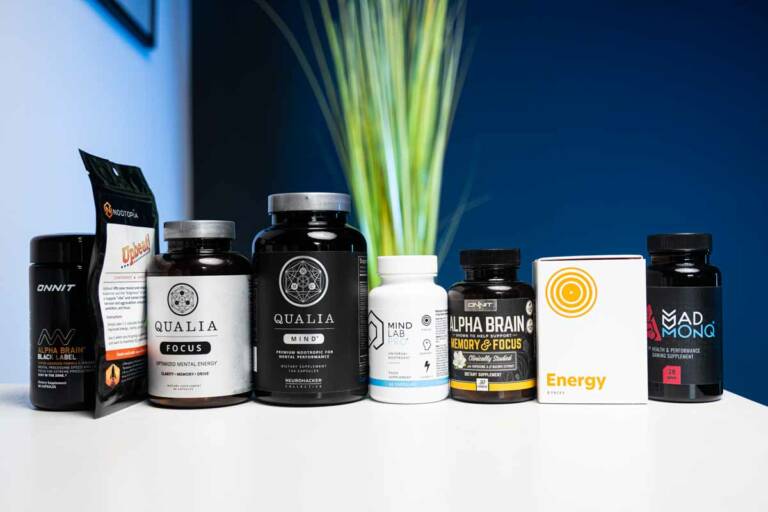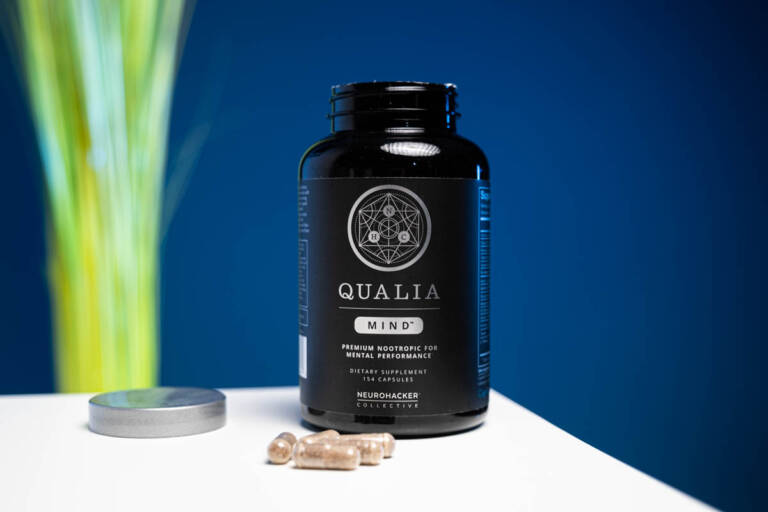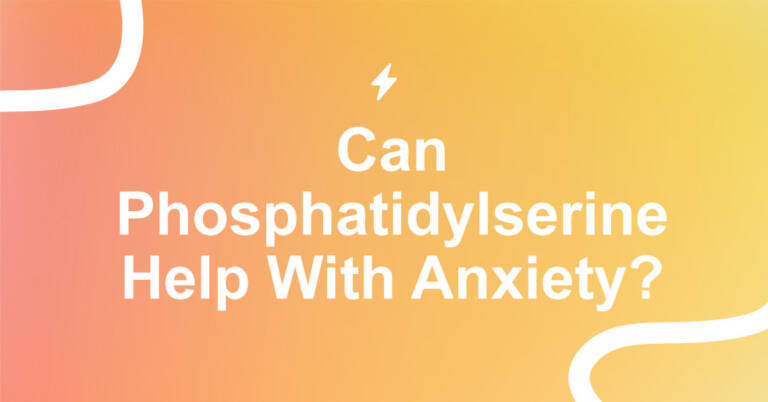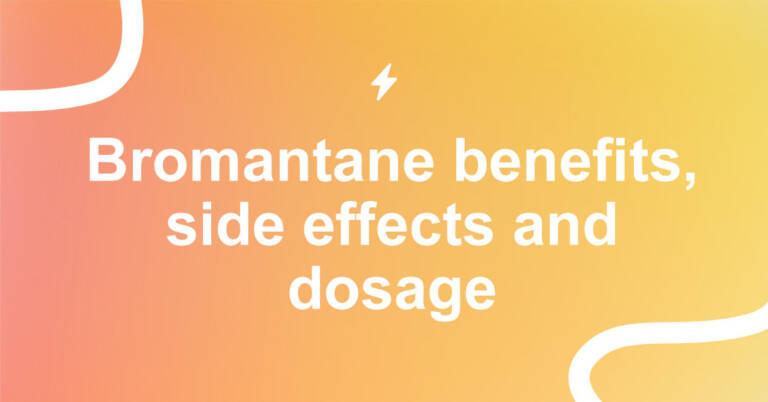Citicoline is a substance produced naturally in the body that is very helpful for optimizing brain function. Hence, its classification as a nootropic. It is a common ingredient used in supplements marketed for brain support, but does it stand up to the hype? Let’s investigate.
Citicoline Review
Citicoline is the generic name for CDP-choline or cytidine diphosphate choline. It is a building block of cell membranes and is instrumental in affecting the brain’s ability to produce acetylcholine, a neurotransmitter important for memory. [1]
While it’s found in every cell in the body, our primary concern here is its role in the brain. So the focus of this piece will be how citicoline can be beneficial for brain health.
Citicoline was originally developed in Japan for treating stroke.
Later on, it was introduced as a prescription drug in several European countries.
It is in these same countries that citicoline is now prescribed as a treatment for addressing circulation issues in the brain linked to thinking problems.
In the US, however, it is marketed as a dietary supplement.
Citicoline Benefits
When you use citicoline in supplemental form, it gets broken down into cytidine and choline, both of which get readily absorbed.
Plus they can easily navigate the blood-brain barrier, where they form again into citicoline.
Now let’s check the main citicoline benefits:
1. Citicoline Enhances Memory
Citicoline has been studied to support memory in individuals with age-related memory impairment. The same has also been associated with brain cell recovery from injuries such as concussion and stroke. [2]
It is ideal for anyone who wants to support the health and function of brain cells during aging or after brain injury. [3]
For the most part, research and studies done on its memory-enhancing effects have been somewhat limited to those on older adults.
Results show that it is most effective for inhibiting memory loss in people between the age bracket of 50 to 85 years old.
2. Citicoline Improves Circulation
The brain needs a constant supply of energy, but can’t store this energy.
Usually, the energy it gets comes from glucose from the blood that flows to the brain. Citicoline improves glucose metabolism while increasing circulation to and in the brain.
Impaired blood flow to the brain may bring about issues like memory loss, vertigo, fatigue, and even stroke.
Citicoline’s effectiveness at enhancing circulation in the area is the reason European doctors have used it as a prescription for so long now. [4]
3. Citicoline Protects The Brain From Harmful Agents
Along with enhancing certain brain functions, citicoline also offers neuroprotective properties.
As we mentioned earlier on, citicoline restricts or regulates movement across the cell membrane. So while it allows in water, oxygen, and nutrients needed for survival, it also keeps out harmful substances.
The cell membranes do so in a rather intelligent and elegant manner, but membranes can become leaky.
If their performance is compromised, heavy metals, metabolic waste, pathogens, and toxins can all find their way in.
Citicoline prevents all this and much more. It acts as a membrane stabilizer, preserving the stability of brain cells.
4. Citicoline Slows Down Cell Aging
Cellular aging can hasten significantly, when cells get exposed to inflammation and damage from free radicals.
The brain is constantly exposed to free radicals. These are unattached oxygen molecules, which target cells in the same manner that oxygen triggers metal to get rusty.
Also known as oxidative stress, this triggers inflammation which is responsible for a number of disorders including Alzheimer’s, anxiety, ADHD, brain fog, and depression, to name just a few.
Studies using PLA2, which is an enzyme that becomes active in bacterial infections, have some interesting results to show.
First off, let us quickly give you a rundown of what PLA2 does.
For starters, it becomes active when there is an incidence of cellular trauma or during oxidative stress. It engages secondary messengers, which can lead to self-perpetuating cycles of inflammation.
When citicoline is introduced with all this activity going on, it plays a reparative role. It repairs membrane potential and lowers lipid peroxidation. [4] Together, these mechanisms prevent new PLA2 from forming by halting the cycle of inflammation.
If there isn’t enough citicoline in the system naturally, you simply use one as a nutritional supplement to get this effect.
5. Citicoline Improves Mood
Citicoline also performs in other areas.
For instance, it has also been linked with increasing the production of key neurotransmitters. These include acetylcholine, serotonin, dopamine, and norepinephrine, all of which are crucial for balancing mood and memory. [5]
Being a precursor to both choline and dopamine, you can be sure to enjoy some increased energy levels, boosted mood, and increased motivation by supplementing with citicoline.
As it gives you the boost you need to improve your mood, your reliance on self-medicating yourself on caffeine, sugar, or other such ingredients will also decrease.
Many such foods short-circuit your brain into trading reward feedback into addictive behavior.
This can quickly turn into a vicious cycle, which will delete your dopamine stores resulting in a negative loop.
To counter this effect, citicoline works naturally, and not to mention safely, to increase levels of dopamine.
This may also be a reason why it is considered a possible safe therapy for individuals living with substance abuse or addiction issues.
6. Citicoline Enhances Vision
Citicoline has also been studied for slowing the progression of visual acuity loss due to glaucoma. Glaucoma is a disease that damages the optic nerve and can lead to progressive vision problems and even blindness.
One study conducted, where patients suffering from primary open-angle glaucoma, were administered an oral solution of 500 mg citicoline. The results of the study were particularly impressive with the mean rate of progression dropping down significantly compared to two years before the study. [6]
The second area where citicoline has shown promise is in amblyopia. Another study done in this area involved giving patients 1000 mg of intramuscular citicoline. The results showed improved visual acuity with no side effects observed.
Its success as a medical drug to improve eye health has now lead to its use as a natural supplement to counteract the development of vision loss.
Regarding vision improvement, successful clinical studies have used between 250- 1600 mg of citicoline every day.
The available forms for this therapy include tablets, gels, and soft gels. Other options are intramuscular injections and eye drops.
The Working Mechanism Of Citicoline
The primary component of citicoline is cytidine, which is what it delivers to the brain.
But instead of supplying just one individual phospholipid, citicoline is actually instrumental in boosting the production of the brains’ own, multiple phospholipids.
But before we proceed any further a phospholipid, in simple language, is a type of lipid (fat) molecule that is a central component of the cell membrane. [7]
As membrane components, these are selectively permeable meaning that they allow only specific molecules to enter or exit the cells
For instance, molecules that dissolve in fat can pass through easily, while others that dissolve in water can’t. In short, phospholipids control and separate the inside of the cell from its surrounding environment.
This is important as it protects the integrity and performance of the cells.
So when in the brain, phospholipids of different kinds have an important part to play in the synthesis of neurotransmitters and proper functioning of neural cell membranes. Needless to say that both these are highly significant factors for healthy cognitive function.
With citicoline in the system, phospholipid production is boosted, which means better functioning cells within the brain.
Citicoline VS Choline
They certainly sound similar, which may lead you to believe that the two are mostly the same. However, there are some differences to consider.
For instance, choline is an essential nutrient related to the B vitamins. The body needs it for synthesizing acetylcholine, which is an important neurotransmitter.
Citicoline, on the other hand, is synthesized by the body from choline and is converted into phosphatidylcholine.
Both do have similar chemical structures since choline is at the core of the citicoline molecule.
That said, citicoline may have some advantages over choline as a supplement, as it is also a source of cytidine.
Cytidine provides additional advantages in the synthesis of nucleic acids in the body. It also means that anyone looking to improve cognitive functioning, memory, and mood can benefit from citicoline supplementation.
Cognizin Review
Cognizin is a clinically tested type of citicoline, which can provide the brain with everything that it needs to function optimally.
It is a patented form of citicoline that is vegetarian and allergen-free and is used widely in supplements catering to mental focus and health.
Cognizin, unlike other sources of citicoline, has been clinically tested in humans.
You can synthesize some citicoline from the choline present in choline-rich foods such as beef, eggs, and seafood.
But to get the brain-boosting benefits of citicoline, you can’t rely on foods alone and will need to opt for a supplement instead.
Citicoline Side Effects
A gradual decline in brainpower is not uncommon. And natural compounds like citicoline are considered safe to use in boosting cognitive functions.
When taken in the recommended dosage, citicoline is well tolerated. But certain groups need to be careful when using any supplements.
Typically, this includes expectant and lactating women. Other than this, some people may experience some difficulty in sleeping, headaches, diarrhea, or nausea.
It is not recommended for anyone using L-dopa as it can interact with it.
Citicoline Dosage
Citicoline is available as a single supplement or as a single ingredient in some supplements.
For supplemental purposes, it is taken orally. But for medicinal reasons, it may also be administered by IV or as a shot.
Typical dosage is between 250 and 1000 mg a day.
If you are currently healthy but want to try citicoline, then you can start with a minimal dose of 250 mg/day.
But if your memory is already impaired, experts recommend starting with 500 mg. However, this should be paired up with other dietary and natural lifestyle treatments.
Citicoline is recommended at 250-1000 mg up to twice a day, separated by about 8 to 12 hours between doses.
The dosage depends on many different factors, so always start any supplement after consulting with your medical practitioner. You may even want to start with a low dose to see how it affects your system.
Instead of taking this supplement long term, it is recommended to develop a cycle with two weeks on and two weeks off.
You may want to stack it up with other nootropics like piracetam (more info) or acetyl-L-carnitine to increase its positive benefits.
Citicoline Reviews
What are others saying about Citicoline? Let’s check out a few Citicoline reviews.
"Recommended for anyone with insufficient sources of choline in their diet, such as eggs, etc,, or someone who uses a type of racetam. This is probably one of the better brands I've tried for citicoline, though it's sad to see ND has essentially stopped selling this product, since it hasn't been in stock for months."
"I like this product more than the CDP choline from other vendors. The capsules are very small, and seem to be very effective. They always prevented or cured the headache I got from racetams."
"This is my favorite choline source, and Nootropics Depot is the best place to get it."
Where To Buy Citicoline?
The best citicoline supplements often contain Cognizin, the patented form which has been studied in clinical trials.
Choose only brands that contain Cognizin citicoline as these will give you a highly bioavailable version.
If you want to order it as an individual compound, click here for the lowest price >>
But as we mentioned before, citicoline is more effective when it is taken with other nootropics.
Therefore, we prefer taking a nootropic stack that also contains citicoline.
Click below to check our top-rated supplements that contain citicoline.
Frequently Asked Questions
Is citicoline a stimulant?
No, citioline is not a stimulant. The difference between citicoline and a stimulant is that citicoline increases the brain’s levels of dopamine.
What is citicoline?
Citicoline is the generic name for CDP-choline or cytidine diphosphate choline. It is a building block of cell membranes and is instrumental in affecting the brain’s ability to produce acetylcholine, a neurotransmitter important for memory.
Can citicoline cause depression?
No, there are no studies proving that citicoline can cause depression. It is considered a relatively safe nootropic for long-term use.






